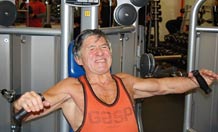
63-year-old amateur bodybuilder, David Brice. Photo by Cassandra Phoenix.
Body building images change perceptions of old age
A University of Exeter researcher has found that showing videos of older bodybuilders working out radically changed young people’s perception of old age.
Dr Cassandra Phoenix told the British Sociological Association's annual conference in Glasgow that before seeing the bodybuilders, students described old people as "decrepit", "useless", "haggard", "wrinkly", "dependent" and "slow".
But after seeing a video of 11 men and two female bodybuilders, aged 50 to 71, working out the students changed their views dramatically. The video showed the bodybuilders lifting heavy weights and talking about their lives and their training.
"I was like 'that's pretty incredible, what they're doing'," one student told Dr Phoenix. "I’ve tried doing weights, and that takes a lot of effort to keep going, so that part of it is really impressive. But the other side of me thinks you should just grow old gracefully, I thought that maybe they were taking it too far. But, it is incredible."
Another told Dr Phoenix: "The bit that rang out to me was the bit where the guy said 'I’m 71, and if you’d asked me 40 years ago, I would have thought, oh no, I don’t want to be 71'. But he said that he felt great. Bodybuilding is quite different to my sport, but hopefully the same message can be possible; that I can feel good when I’m older, just through keeping active...that part stood out to me because I don’t want to get old, but he’s old, and he’s alright."
In her presentation, Dr Phoenix said that what younger people thought of the elderly taking part in sport affected how the generations related to each other.
Also, older people wanting to take part in sport might be encouraged or put off doing so by the reaction of younger people around them to their activity, she said.
Dr Phoenix, who is based in the University of Exeter's School of Sport and Health Sciences, said the negative words the students chose to describe older people before seeing the video demonstrate the extent to which young people "currently draw upon and reinforce the narrative of decline in relation to the ageing process."
She said that material such as the video might be useful "for intervention when attempting to challenge the prevailing negativity about old age that is often inscribed into the bodies of young people".
The 14 students who took part in the research were aged between 19 and 23.
Date: 6 April 2010
